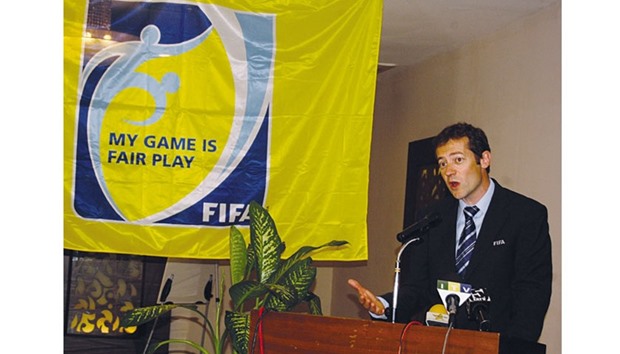FIFA is confident that the world football federations have taken on board the need for reform and will unite in providing the votes essential to push the world governing body into a more credible new era.
A gospel of hope to that effect was delivered by Nicolas Maingot, FIFA's acting director of communications, at the AIPS annual congress in Doha yesterday.
Most of the focus of the extraordinary congress on February 26 in Zurich has been directed at the election of a new president to succeed disgraced and banned Sepp Blatter but probably more important will be a vote on a package of reforms.
Maingot set out the reforms to delegates from the world's sport media associations and explained the voting system among the 209-member associations. The reforms involve a change of statutes which demands the approval of at least 75 per cent of the eligible voters, which comes to 157.
Issues such as terms limits had failed to attract the necessary support in the past but Maingot was certain that, after the events of last year, the world game belatedly understood the need to move forward.
Maingot noted that FIFA's 'normal activities'—tournament organisation and development programmes—had been unaffected by the variety of scandals, crises and arrests.
However, the need for governance change was imperative. Hence a package developed by a reform committee chaired by Swiss lawyer Francois Carrard would be put to vote in a fortnight's time, Maingot informed.
The proposals include converting the executive committee into an expanded council with a separation of political and managerial responsibilities, term limits and pay transparency etc.
"Those reforms are here to help not only FIFA but the entire football community around the world. It's about regaining trust and credibility and improving our reputation to those who matter most—who are the fans. That is absolutely essential and I think this message has been received," Maingot said.
"The body which came up with these proposals was chaired by an independent person in the former director-general of the IOC but was composed of 12 individuals appointed by the confederations and that should give us confidence that the reforms should be pushed through," he added.
Even if the reforms were approved, changes could not occur overnight. "It will take us quite some time and this will all depend on what will come next, but we are all working hard to recover as soon as possible.
"It's essential that we are (perceived) by all of you, media and fans, as ethical, approachable, humble and transparent. It will take time because our credibility has been seriously affected in some areas.
"The events of the last nine months have had a negative impact on sponsorship. That's quite clear... but certainly we are positive that things will evolve positively once the reforms have been adopted," Maingot said.

Nicolas Maingot, FIFA's acting director of communications, was one of the keynote speakers on the concluding day of the AIPS Congress yesterday. While admitting that FIFA's image had taken a beating due to the various curroption scandals, Maingot said he was hopeful that the proposal of reforms would be passed with a thumping majority during the FIFA Congress in Zurich on February 26.
